Gaza
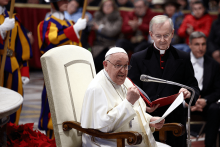
An Israeli government minister criticized Pope Francis on Friday for suggesting the international community should study whether Israel’s military offensive in Gaza constitutes a genocide of the Palestinian people.
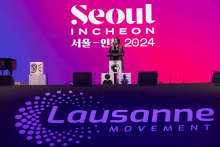
Ruth Padilla DeBorst told her audience: “There is no room for indifference toward all who are suffering the scourge of war and violence the world round, the uprooted and beleaguered people of Gaza, the hostages held by both Israel and Hamas and their families, the threatened Palestinians in their own territories, all who are mourning the loss of loved ones.”
Less than 48 hours later, the director of the Fourth Lausanne Congress emailed all attendees, issuing a lengthy apology for Padilla DeBorst’s speech.
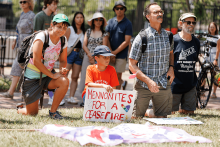
Starting on Thursday, July 18, between 35 and 125 Mennonites and interfaith allies from the U.S. and Canada made steady progress on their 11-day, 141-mile “All God’s Children March for a Ceasefire” trek from Harrisonburg, Va., to Washington, D.C. Upon arrival in Washington on Sunday, July 28, the marchers urged Congress and President Joe Biden’s administration to support an immediate, permanent ceasefire, the release of all hostages and political prisoners, an end to military aid to Israel, and a political solution that ends the occupation of Palestine, ensuring peace for Palestinians and Israelis. And on Tuesday, July 30, 46 of the people were arrested by Capitol Police during a protest.
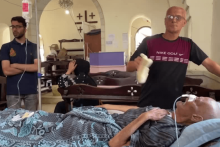
The Episcopal Church of Jerusalem and the Middle East protested the closure of Al-Ahli Arab Anglican Hospital in Gaza City as a result of the evacuation of several residential districts ordered by the Israeli military.
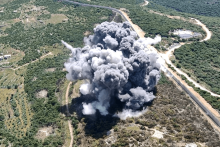
A group of us stood on a hill overlooking northern Gaza this spring, not far from the border fence. We were close enough to see the buildings of Beit Hanoun and Jabalia. After a few minutes of description by our guide, we surveyed the scene with binoculars. On closer inspection, what had appeared to be buildings turned out to be rows of rubble. While for months we have viewed such images on screens, actually seeing the destruction, through plumes of smoke and dust, was surreal.
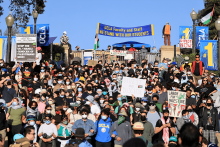
Since Oct. 7, 2023, when Hamas launched a terror attack against Israel, young people across the country have looked with alarm at Israel’s military action and the U.S. support for it.
“As soon as that day happened, I felt I was just kind of flung into high gear,” said Logan Crews, who is a first year Master of Divinity student at Yale University. “I began talking to friends right away and just processing through what was happening.”
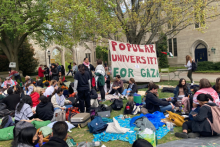
Just a short walk from my home near Princeton University, students, faculty, staff, and community members have come together to demand the university divest from financial and military support of the state of Israel and release a public statement calling for a ceasefire in Gaza — one of many similar protests that have been happening at college campuses across the U.S. over the past two weeks. Stroll by the encampment at any given time, and you’ll see folks of all ages and races gathered together on blankets and tarps sharing crowdfunded hot meals as scholars address the group; kids play and others offer physical and spiritual care, or clean up the encampment grounds. You might hear community announcements, prayer, music, or, at times, chants like “disclose, divest / we will not stop / we will not rest.”

“I appeal once again that access to humanitarian aid be ensured to Gaza, and call once more for the prompt release of the hostages seized on last Oct. 7 and for an immediate cease-fire in the Strip,” he said in his Urbi et Orbi address.
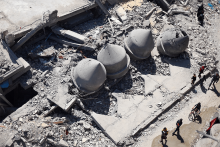
Palestinians in Gaza held the first Friday prayers of Ramadan outside the ruins of a mosque leveled by Israel’s offensive, one of hundreds the Hamas-run authorities say have been damaged or destroyed by Israeli attacks since October.
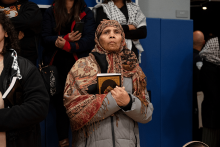
Human rights advocates have cited a rise in Islamophobia, anti-Palestinian bias, and antisemitism in the U.S. and elsewhere.
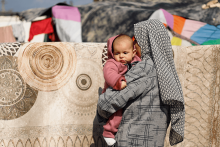
When Israeli troops stormed Nasser Hospital in southern Gaza, the ensuing chaos effectively shut down the hospital, with soldiers forcing women and children to leave the maternity ward according to Doctors Without Borders. The invasion of the hospital underscored the heavy toll the Israeli assault has had on pregnant people and infants. Doctors Without Borders described Israel’s incursion as forcing “inhumane” birthing conditions.
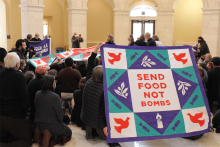
Earlier this year, I was arrested alongside more than a hundred other Mennonites in Washington, D.C., as we raised our voices in song, demanding that our elected officials call for a cease-fire in Gaza. Being a part of this act of peaceful civil disobedience, organized by Mennonite Action, gave me a sense of clarity about my faith that I had sought for years. As Capitol Police officers zip-tied my wrists behind my back, I sang louder and thought to myself: “This is what it means to be a Christian. This is what pacifism meant to my Mennonite ancestors.”

In Gaza, millions are being “overlooked or ignored.” Right now, people are starving and clinging to the fading hope that somehow territorial, historical, religious, and political crisis can yield to compassionate humanity. This, friends, represents our highest and most crucial calling. We are compelled by the teachings of Jesus to offer help — and we must act.
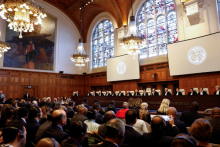
The World Court ordered Israel on Friday to prevent acts of genocide against the Palestinians and do more to help civilians, although it stopped short of ordering a ceasefire as requested by South Africa. While the ruling denied Palestinian hopes of a binding order to halt the war in Gaza, it also represented a legal setback for Israel, which had hoped to throw out a case brought under the genocide convention established in the ashes of the Holocaust.
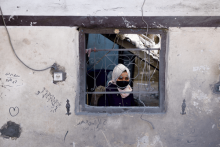
The prevailing public narratives we have used to justify military strategies amid diplomatic fantasies are being exposed as meaningless: Unfettered Israeli military power can never impose a lasting solution nor quench Palestinian aspirations for sovereignty and justice. Likewise, Palestinian armed factions can never defeat Israel’s military power, backed by the unequivocal support of the U.S. These exclusionary self-vindicating visions dominate in a completely zero-sum game. Escalating violence wantonly kills, intensifying the compulsion to eradicate the human dignity of the “other.” In short, there is no military solution to the raging warfare spilling over our screens and tearing our hearts asunder.
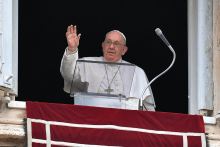
Pope Francis, tackling conflicts in the Middle East and Ukraine in his yearly address to diplomats, said on Monday that “indiscriminately striking” civilians is a war crime because it violates international humanitarian law.

“I have friends and family who lost people in the attack by Hamas on Oct. 7. I have colleagues and friends in Gaza who were bombed by the Israeli attack. I go to demonstrations against the genocide in Gaza because I want to be with others that shout and call for the immediate stop of this unforgivable crime. And I cannot chant all the chants in those demonstrations. I chant some of them.”
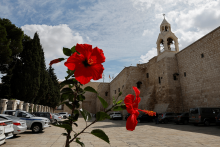
At a vigil for peace in Washington, D.C., this Tuesday, Palestinian Lutheran pastor Munther Isaac spoke about the approaching Christmas season in his home of Bethlehem in the West Bank.
“How can we celebrate when we feel this war — this genocide — that is taking place could resume at any moment?” he said.
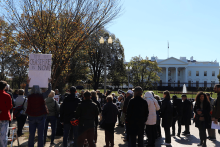
Fifty protesters gathered for a “pray-in” in Lafayette Square on Thursday afternoon, holding signs directly facing the White House that said, “Catholics say ceasefire now.”
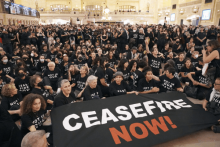
Wars, by their very nature, often force people to choose sides and dehumanize the other side to justify violence. We’ve seen the dangers of this binary here in the U.S. as some student groups in support of Palestinian liberation have wrongfully praised or failed to condemn Hamas’ attacks, while some pro-Israeli groups (including many U.S. Christians) have failed to acknowledge the injustice of the ongoing occupation of Palestine and the severe death toll Israel’s response has inflicted on Gazan civilians. Yet while the powers of the world want us to take a side and declare ourselves fully (and exclusively) pro-Israeli or pro-Palestinian, Christian compassion must be freed from favoritism. As peacemakers, we must honor the image of God in every Israeli and every Palestinian.